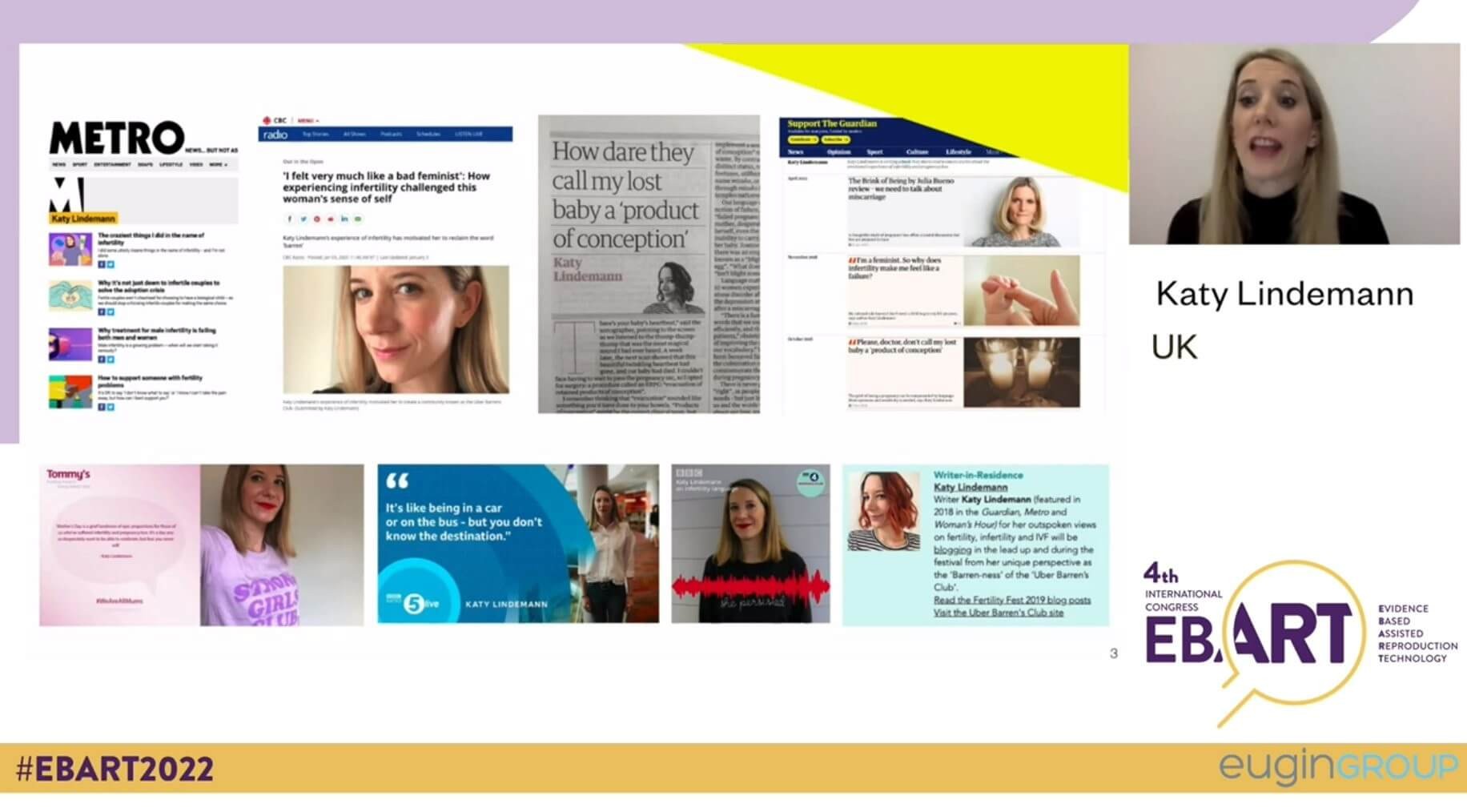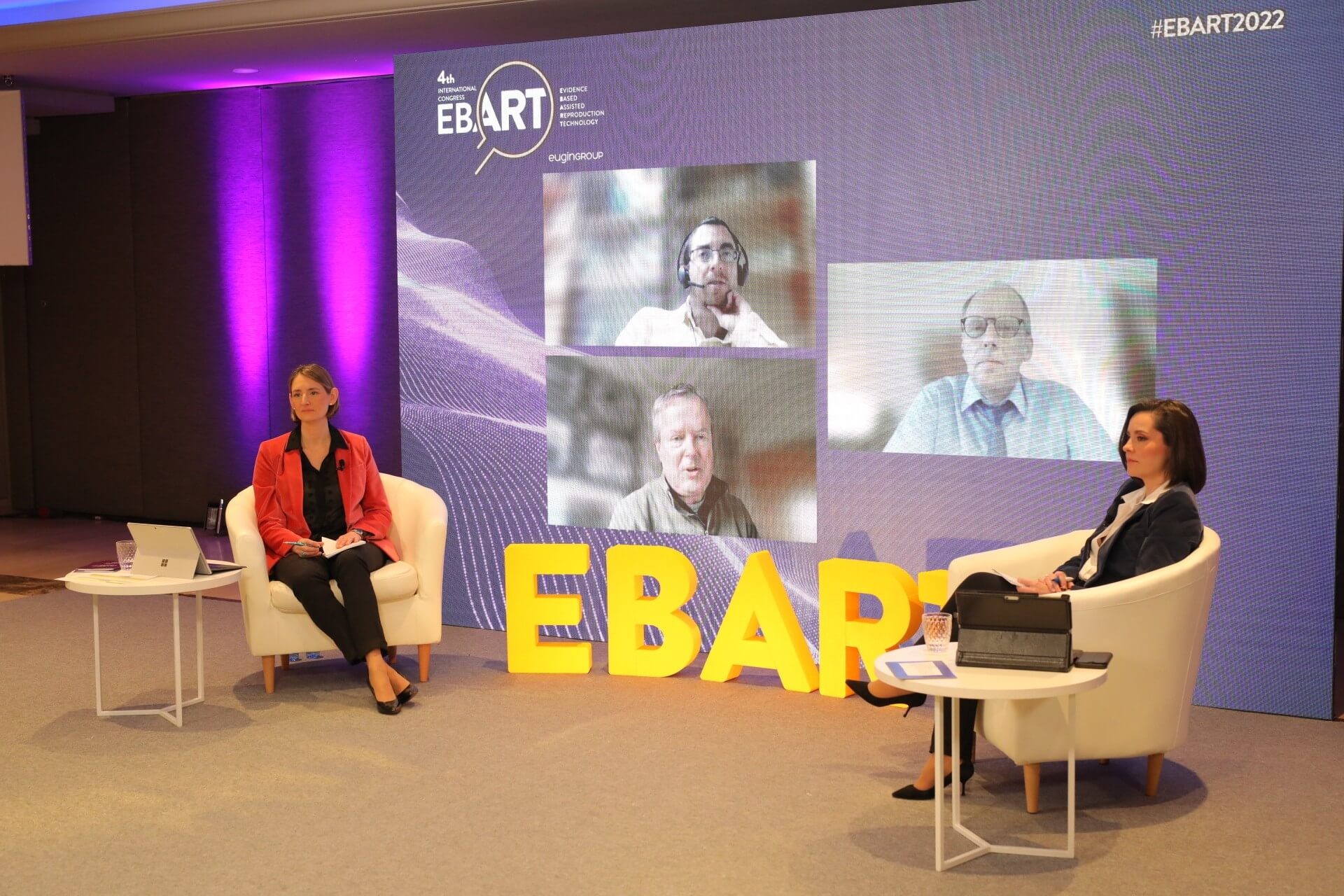The fourth annual EBART (Evidence-based Assisted Reproduction Technology) International Congress once again brought together the world’s leading experts in assisted reproduction. Organised by the Eugin Group and co-directed by Rita Vassena, Scientific Director of the Eugin Group; and Amelia Rodríguez-Aranda, the Eugin Group’s Medical Director, the EBART conference took place on 9, 10 and 11 March 2022 with a panel of 14 new speakers and a record attendance of 2,300 registered practitioners from 53 different nationalities.
An event to talk about challenges
The aim of the congress is not only to generate scientific conversation about assisted reproduction, but also to share knowledge among specialists, and all within the scope of scientific evidence.
This fourth EBART conference was divided into 5 interesting sessions revolving around these hot topics within the sector:
- A segment to talk about PGT or pre-implantation genetic testing: how it is currently being used and what its possibilities are for the future.
- How to approach the medical treatment of patients. The importance of emphasising good practice in terms of access and counselling for assisted reproduction treatment.
- The new ethical and technical challenges in the sector, particularly shaped by the Covid-19 pandemic over the last two years.
- Topics for discussion: repeated implantation failures and the future of egg donation.
- The closing session dealt with communication between clinics and patients, based on scientific evidence. A segment that featured the participation of the English writer and patient Katy Lindemann, who gave the clinical team an outsider’s perspective. Katy explained, among other things, how necessary it is for patients to have very clear and concise information, especially when it comes to medical consent. She also called for more honesty regarding the outcomes of all recommended treatment techniques.

Conclusions based on scientific evidence
Following a healthy lifestyle improves the chances of pregnancy in both natural and assisted reproduction processes. This is one of the main conclusions reached by the speakers drawn from different fields of study.
On the one hand, Dr. Karinna Lattes, who specialises in assisted reproduction at CIRH, points out that infertility of unknown origin affects 30% of couples suffering from infertility. Therefore, in these types of cases, it is essential that specialists intervene in order to thoroughly identify indicators, habits or practices that may be negatively affecting fertility, such as the body mass index of both partners; symptoms of stress and depression; poor sleep hygiene; or cigarette smoking, among others.
According to Lattes, “personalised lifestyle interventions have an impact on increasing the chances of natural conception in infertility processes of unknown origin and should be systematically addressed in patient counselling. As specialists in this area we have a responsibility to strike a balance between efficacy, safety and cost for each procedure.
From another field of study, focusing on the analysis of repeated implantation failure, Dr. Demián Glujovsky, a specialist in Reproductive Medicine at Cegyr, agrees with Dr. Lattes that it is essential to start from a good state of health in women diagnosed with this problem before initiating treatment. “Physical condition is a fundamental prerequisite as a starting point because, otherwise, we cannot carry out different procedures and this can cause, among other consequences, a negative psychological impact on patients,” Glujovsky stresses.
According to Dr Rita Vassena, the Eugin Group’s scientific director and the co-director of EBART, “bringing to the table and analysing similar conclusions reached from different studies, specialities and parts of the world, is what determines the importance of meetings like EBART, which is a forum where multidisciplinary scientists from different parts of the world can stop and reflect on the advances in the sector, especially at a time like the present”.
Covid-19 and reproduction: no impact on fertility and vaccination is recommended.
Professor Richard Anderson of the University of Edinburgh addressed the consequences of Covid-19 in the field of assisted reproduction from three perspectives: the impact of the closure of clinics during lockdown; the uncertainty about the impact of the virus on pregnancy and fertility; and finally, vaccination in pregnant women.
Firstly, with regard to the closure of assisted reproduction centres, according to various studies, the delay in treatment particularly affected women over 40 years of age and those diagnosed with specific infertilities. Young women and couples diagnosed with infertility of unknown origin were less affected.
With regard to uncertainty about the impact of the virus on pregnancy, according to a study released in April 2021, this situation caused 53% of women to change their pregnancy plans. Of these, 72% made this decision for reasons such as fear of the side effects of the virus on mother and baby or lack of access to medical services to remove intrauterine devices.
In relation to the impact of Covid-19 infection on fertility, the scientific literature has suggested that it may affect fertility in men in the short term due to the inflammation caused by the disease, although these effects disappear in the long term, while the impact on women is less.
Finally, regarding the vaccine, studies agree that it is recommended during pregnancy, both for those who are already pregnant and for those who are trying to become pregnant. Furthermore, they point out that Covid-19 infection in pregnant women can lead to serious problems, whereas the vaccine is completely safe for pregnant women.








